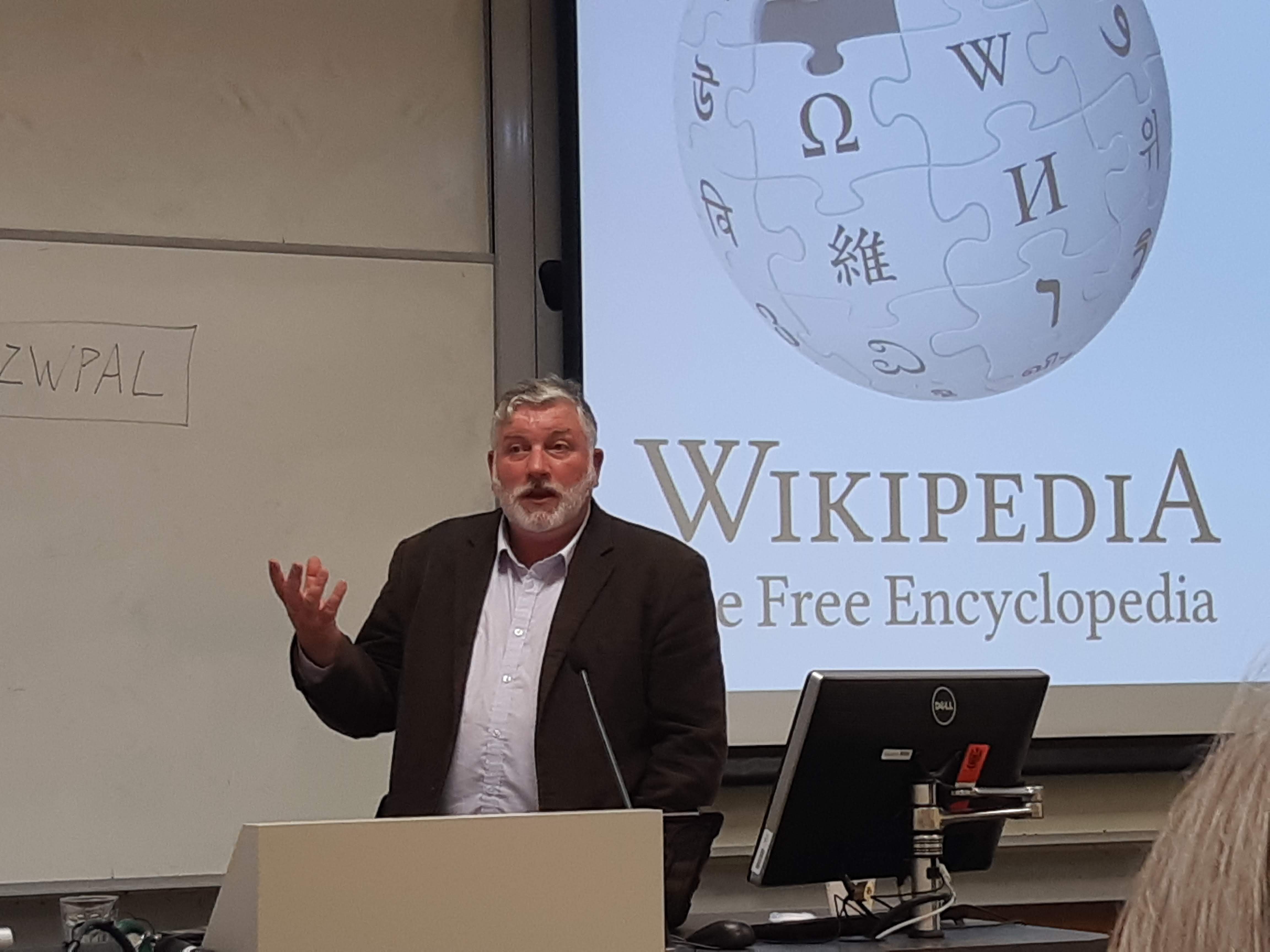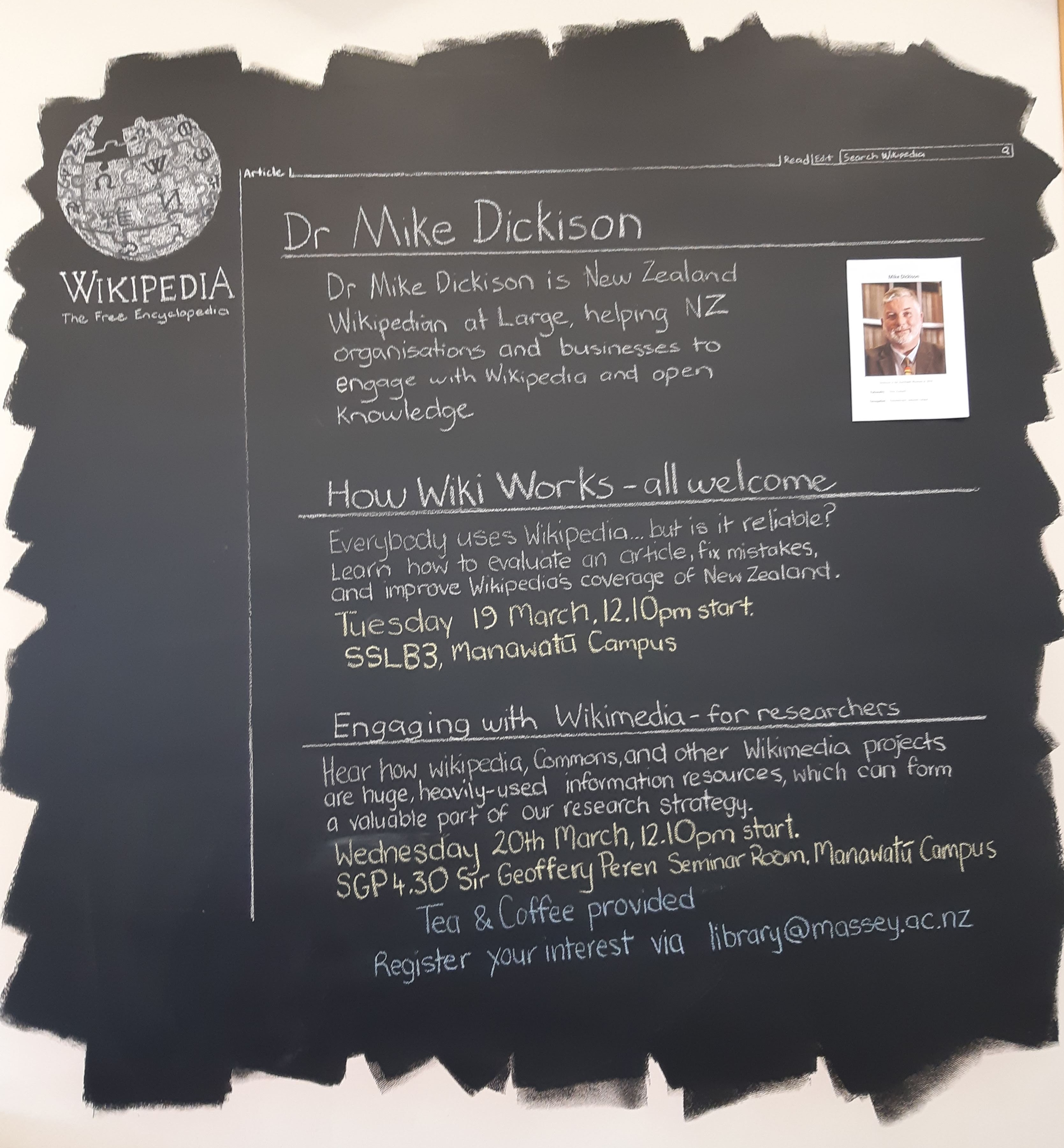Wikipedia boosts visibility and readership of your research
March 21, 2019
A few minutes editing a Wikipedia page can expose your research to hundreds or thousands of views a day, and potentially double the readership of your publication, according to NZ Wikipedian-at-Large Dr Mike Dickison who visited Massey University recently, hosted by Research & Enterprise and the Library.
Some of the highlights from his presentations are particularly relevant to researchers.
Wikipedia articles appear at the top of Google results, often with a preview in the sidebar. It’s the fifth most visited website in the world, with 70 million visitors a day. Everyone uses it and anyone can edit it. So why wouldn’t you put your own research there to reach a wider audience?
For effort vs. impact, Dr Dickison says that Wikipedia may be the most effective use of time spent on outreach, compared to websites, social media, and other ways of disseminating research.
Some practical steps for researchers to take advantage of Wikipedia’s huge reach are:
- Get your publications online and preferably open access. They are most likely already in an online journal – but be aware that many readers will hit a paywall, which isn’t always obvious to Massey users who connect seamlessly when signed in. Most articles, grey literature and other outputs can be easily made open access via Massey Research Online – your subject librarian can help with this. Even a blog post can be a suitable output for something not yet at article stage.
- Cite your publication in an existing relevant Wikipedia article, and link to the online version. This is the bit that might double your readership. It might only be a sentence. We don’t advise creating a whole new article if you’re a beginner wiki editor.
- Add a a couple of other statements (with relevant references) to the Wikipedia article while you’re there, to help improve it. You’ll know what’s important in your area of expertise so it should be quick and easy. Just self-citing isn’t really in the spirit of Wikipedia and might be seen as spamming.
You’ll need to get familiar with editing Wikipedia, but it’s reasonably quick (hence the name – Wiki means quick in Hawaiian). There is plenty of help on the site, and here are a few tips:
- Find a relevant article, click on edit, and in the top right of the article you may want to set to Visual Editing (unless you are familiar with Source Editing).
- Edit as an individual, not an institution – but it can still be anonymous.
- No conflicts of interest – you can’t write about yourself, family, employers or employees. But you can write about other researchers to help raise their profile (they might return the favour) and you can definitely write about your research.
- All information added to articles must be based on references to reliable published sources. Your qualifications, job title, institution and reputation don’t count. Your publications do.
- If someone edits or undoes the information you added, take a deep breath. Discuss it with them on the article’s Talk page.
- Further help is available on Help: Wikipedia editing for researchers, scholars and academics.
Other Wikimedia projects include Commons and Wikidata. Wikimedia Commons is Wikipedia’s huge open licence image library, where anyone may upload and/or use images (with the appropriate attribution), including in teaching and publishing. Uploading your own photos makes them available for wide use, and possibly increases the visibility of your research. Mike was key in getting photos related to the Mosque attacks freely available here, including the widely-shared image of Jacinda Ardern by Kirk Hargreaves. Wikidata (the fastest-growing project) is the database of structured data supporting the Wikimedia projects (such as Wikipedia).
Dr Dickison spoke about many other aspects of Wikipedia, for example:
- Students… will find Wikipedia useful at the start of information searches for assignments, and the reference list may have suitable items to include in their own assignment reference list, but Wikipedia itself should not be referenced. He encourages them to be critical consumers of information. Librarians can help with information literacy teaching in courses.
- Teachers… may want to try setting Wikipedia editing as an assignment – it can be more engaging that an essay and has been done very well (and also badly) by some universities. More about this is on Wiki education.
- Wiki editors… there are often editing workshops held around the country, where people get together (maybe at the pub) to improve a particular subject area. If you’re interested, look out for these, or Mike can put you in touch with locals.
Our thanks go to Dr Dickison for his enlightening presentations. We recommend you go along if you have the chance to hear him speak in future.
Search posts
Categories
Tags
Recent Comments
- May 2025
- April 2025
- March 2025
- February 2025
- January 2025
- December 2024
- November 2024
- October 2024
- September 2024
- August 2024
- July 2024
- June 2024
- May 2024
- December 2023
- November 2023
- October 2023
- September 2023
- June 2023
- May 2023
- February 2023
- January 2023
- November 2022
- October 2022
- September 2022
- August 2022
- July 2022
- June 2022
- May 2022
- March 2022
- January 2022
- November 2021
- August 2021
- July 2021
- May 2021
- April 2021
- March 2021
- December 2020
- November 2020
- September 2020
- August 2020
- June 2020
- May 2020
- April 2020
- March 2020
- February 2020
- November 2019
- October 2019
- September 2019
- July 2019
- June 2019
- May 2019
- March 2019
- February 2019
- December 2018
- November 2018
- October 2018
- September 2018
- August 2018
- July 2018
- June 2018
- May 2018
- April 2018
- March 2018
- February 2018
- January 2018
- December 2017
- November 2017
- October 2017
- September 2017
- August 2017
- July 2017
- June 2017
- May 2017
- April 2017
- March 2017
- February 2017
- January 2017
- December 2016
- November 2016
- October 2016
- September 2016
- August 2016
- July 2016
- June 2016
- May 2016
- April 2016
- March 2016
- February 2016
- January 2016
- December 2015
- November 2015
- October 2015
- September 2015
- August 2015
- July 2015
- June 2015
- May 2015
- April 2015
- March 2015
- February 2015
- January 2015
- December 2014
- November 2014
- October 2014
- September 2014
- August 2014
- July 2014
- June 2014
- May 2014
- April 2014
- March 2014
- February 2014
- January 2014
- December 2013
- November 2013
- October 2013
- September 2013
- August 2013
- July 2013
- June 2013
- May 2013
- April 2013
- March 2013
- February 2013
- January 2013
- December 2012
- November 2012
- October 2012
- September 2012
- August 2012
- July 2012
- June 2012
- May 2012
- September 2009
- November 2008



Leave a Reply